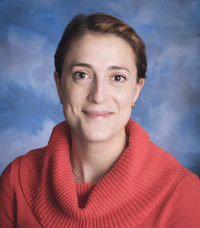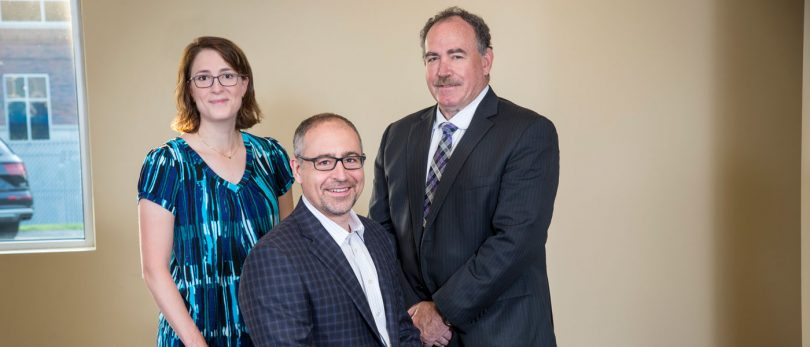Opioid use disorder is front-page news, and for good reason. The number of people addicted to opioid drugs, which include prescription painkillers as well as the illegal drug heroin, has risen dramatically in recent years. Nationwide, the death toll from accidental opioid overdose now outnumbers that from car crashes.
UHS has a front-line perspective of the crisis, says Alan Wilmarth, administrative director, UHS Behavioral Health. This March, UHS emergency departments reported an 86 percent year-to-date increase in the number of patients seeking treatment for opioid-related problems, and its methadone and inpatient treatment programs have seen steadily growing patient volumes for more than seven years.
The result is an enormous need for better prevention measures and expanded treatment services, Mr. Wilmarth says, and UHS is stepping up alongside state and local agencies to do its part. “The majority of people addicted to opioids today started with a legitimate prescription for pain medication, and we in the healthcare field need to have a key role in addressing this crisis.”
As one of the largest regional providers with decades of experience providing addiction services, UHS is well positioned to help. Its integrated opioid program encourages “wraparound” care that engages patients with specialists, primary care physicians and community agencies to help prevent addiction, expand access to addiction treatment and support successful outcomes.
“Our guiding philosophy is that addiction is a chronic disease and affects people from all walks of life,” says Mr. Wilmarth. “Our doors are open, and our commitment is to serve all who need our help.”
UHS Opioid Program highlights:
- Expanded outpatient clinic: The remodeled New Horizons clinic at UHS Binghamton General Hospital ensures greater access and shorter wait times for those in medication assisted treatment, encouraging continued participation. (See No Limits.)
- Remote treatment access AND support: UHS has expanded rural access to addiction treatment with coordinated care and appointment hours at UHS Chenango Memorial Hospital (at UHS Primary Care Oxford) and UHS Delaware Valley Hospital in Walton. An interdisciplinary team connects primary care providers (PCPs) to community agencies for support addressing medical and social issues that can derail a patient’s treatment.
- Primary care recruitment: UHS is encouraging more primary care providers to get certified to prescribe buprenorphine/naloxone (Suboxone) to effectively manage patients’ long-term addiction care with support from UHS Addiction Medicine specialists. (See ‘Hub and spoke’ sidebar.)
- A “no firing” goal: Patients do better when they stay engaged, despite periods of noncompliance. UHS encourages primary care providers to keep patients in treatment and on the road to recovery despite setbacks, rather than ending care.
- Immediate readmission to treatment: UHS makes a commitment to primary care providers that its inpatient and outpatient treatment clinics will quickly readmit relapsed patients.
- County Sheriff partnership: An incarcerated person is very vulnerable to relapse and overdose following release from jail. UHS has partnered with the Broome County Sheriff’s Office to provide treatment for this population. (See Opportunity for Treatment.)
- Pregnancy program: This caring, non-judgmental program supports mothers with opioid use disorder throughout pregnancy, delivery and after birth. A medical and psychosocial counseling team works in tandem with community education and housing programs to help mothers recover and remain abstinent, while keeping baby healthy and families together. (See Healthy Mom, Healthy Baby.)
- Prescription reduction program: Opioid painkillers are not always the most effective long-term solution for pain. UHS’ Prescription Reduction Team of specialists and PCPs is setting guidelines for safe prescriptions and care, and encourages physicians to find and address the root causes of patients’ pain without unnecessary or long-term exposure to opioid medications. (See ‘Prevention First’ sidebar.)
Prevention First
Reducing reliance on opioids
Despite evidence that opioid drugs are often a gateway to addiction, they remain a go-to prescription treatment for pain. To help stem the tide of new opioid addictions, UHS has put together a multidisciplinary Prescription Reduction Team of specialists with the goal of reducing unnecessary prescriptions. The team, which began meeting in January 2017, includes primary care physicians and orthopedists, psychiatrists and chiropractors who are looking to standardize how UHS physicians prescribe pain medicine and how to best support individuals with opioid use disorder.
“We’re taking a hard look at how to deal with chronic pain by broadening the education of our PCP affiliates, highlighting that there is an over-prescription epidemic, exploring other avenues of pain relief, limiting the use of the drugs and standardizing the prescription process,” says team member Alan Miller, MD, a primary care physician and president of UHS Medical Group.
“There is a role for opioids in pain management, but it’s limited,” adds team member Matthew Bennett, MD, board-certified orthopedist and director of UHS Pain Management. “We have learned there are downsides even when they’re used in the right way and there is no addiction or misuse occurring. There are other, equally effective options available, and if we do use opioids, we want to have an exit strategy, a plan to taper the dosage or stop using when appropriate.”
For the primary care provider, this means working closely with patients to explore alternatives to addressing pain, such as physical therapy, chiropractic care, yoga, acupuncture and mental health therapies, says Dr. Miller. When the use of opioids is appropriate, physicians are encouraged to follow federal guidelines, having patients sign a pain contract, limiting use of the drugs, and checking urine for signs of illicit drug use or medication non-compliance.
Hub and Spoke
Licensing PCPs to provide opioid use disorder care
UHS has found that the safest, most effective treatment for opioid use disorder is medication assisted treatment (MAT), combined with intensive counseling and social support.

Julia Hunter, MD
While buprenorphine/naloxone has been available for use by primary care providers (PCPs) since 2002, until recently, MAT has been primarily overseen by addiction medicine specialists. But as the number of people seeking help grows, this core group of specialists can’t do it all by themselves, says Julia Hunter, MD, assistant medical director, UHS Addiction Medicine.
“To effectively treat all patients, including patients in our remote service areas, we need to partner with primary care,” she says.
To that end, UHS is encouraging primary care providers to become licensed to prescribe buprenorphine/naloxone. Peter Ronan, MD, and Dr. Hunter have led one training session for UHS physicians and are planning on holding another training session for all community providers this fall. Physicians who attend this training learn the tools and skills needed to safely and effectively prescribe buprenorphine/naloxone and keep patients engaged in treatment.
This model of care allows UHS addiction medicine specialists to act as a hub for specialty referrals and as a support for PCPs. “Just as a PCP may manage a patient’s diabetes care, with referrals to an endocrinologist when needed, a licensed and trained PCP can manage a stable patient’s long-term addiction care on buprenorphine/naloxone,” Dr. Hunter says. “Our end goal is to increase patient access to what we’ve found is the most effective way to manage this disease.”
REACH OUT
UHS provides effective, safe treatment for opioid addiction in a non-judgmental atmosphere. Call 762-2901 to schedule a consultation.







